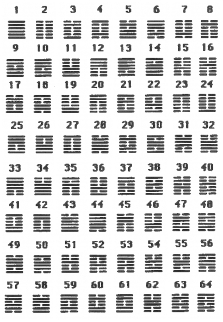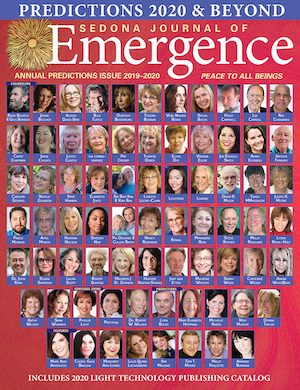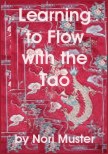
I Ching Predictions for 2020
Small Steps and Compassion Lead to Success
by Nori Muster
We face a troubling future until humanity can unite around sustainable practices for the planet. Those of us who are older have long envisioned a time when people will work together. However so far, instead of the cooperation our planet needs, we witness a rash of propaganda and hate.
To look into the future, let's look into the past. The Daoist Book of Changes, the I Ching, is an ancient oracle. It consists of sixty-four Hexagrams, or scenes, each containing six lines. The lines show us the positive and negative attitudes people take as they play out their part in the scene. The I Ching dates back to the BCE, and people have studied it for centuries to learn the best attitudes to take in a given situation. To this day in Daoist temples, people throw their I Ching with sticks or coins, then consult the monks for their reading.
To find the most productive attitudes for the changes in 2020, I selected three Hexagrams: Life's Trials (Hexagram 29), The Strong Trying to Obstruct the Weak (Hexagram 12), and Reverence (Hexagram 20).
Life's Trials Ahead
Hexagram 29: Life's Trials: Every religion, including the New Age, has a concept of life's trials or tests that potentially contain valuable lessons. Hexagram Twenty-nine discusses this concept from the Daoist point of view. The Hexagram recommends people work through these trials to receive the blessings. In other words, we need to learn from our problems, or we are doomed to repeat them.
The first and last line in this Hexagram lay out the weakest, least helpful attitudes:
Line 1 (yin): The first line shows a person facing constant trials, but who hides out in a well. This is unfortunate because the way will only become more difficult. For one thing, running shows cynicism and anger. We already have plenty of that in our world, and more will just make things worse.
Line 6 (yin): The sixth line shows a hopeless person bound by strands of twine. This person could break free, but has no will to do so. Unfortunately, they don't understanding the troubles are merely the regular lessons of life.
Life involves struggle, including from problems we didn't cause. However, if something we love is threatened, we must stand up. Binding ourselves up in twine is a metaphor for self-pity, and self-pity is the most destructive human emotion.
The remaining four lines suggest positive attitudes:
Line 2 (yang): The subject of this line is in the midst of tribulation. Although there is no relief in sight, the subject moves forward. Going forward, even with small victories, brings incremental progress.
Line 3 (yin): The subject of this line faces conflict after conflict, then takes a temporary respite. This suggests mindfulness because the subject recognizes when it's time to rest. This is positive because in resting, the subject will avoid digging into a deeper rut.
Line 4 (yin): The next line explains the best way to seek respite. Rather than hide in a well, like the subject of the first line, this line recommends people join together with bread and wine. Bread and wine symbolize the meeting of the strong and the flexible in holy communion. Coming together in love to share our burdens, we are renewed to face the work ahead.
Line 5 (yang): This line shows the rut filled with water, but not overflowing. The subject of the line does not retreat into the well, but sets a steady course to bring about needed order. This is correct.
This time our trials are existential, but the message in Hexagram 29 is to see all life's problems as regular problems and do our best to solve them. When we become tired from the struggle we can renew our spirits by meeting likeminded people in demonstrations of solidarity on the streets, in ballrooms, and in our living rooms.
Transform the Scrooge Spirit
Hexagram 12: The Strong Trying to Obstruct the Weak: All six lines in this Hexagram instruct leaders to treat others well, beginning with this warning:
When the strong demonstrate their lack of benevolence, trying to obstruct the weak, it creates an unbalanced situation. The inhumanity of the strong will ultimately lead to their defeat.Line 1 (yin): The first line offers a metaphor for how people in positions of power affect other people's lives. It's subject pulls up a clump of grass, bringing with it other stalks that are connected at the roots. It says if the person remains honest and sincere, this will lead to a good outcome. But if they act out of greed, it will lead to their ruin. Although this makes sense, we now see how long cruelty can continue without any apparent karmic reaction.
Line 2 (yin): The subject of the second line is a common person who works hard and is obedient to the system. If the leader exploits the workers it leads to negative consequences for the leader. It says, "He would be better off to improve the workers' situation."
Line 3 (yin): This line shows a leader who listens to his conscience, and regrets taking advantage of the weak. This is fortunate because through apologies and amends, the leader can correct past mistakes. In other words, shame is an essential part of this cycle. So far there is little or no contrition from leaders in the fossil fuel industry, from those who abuse immigrants and citizens, or from cowardly people who continue to say guns are the solution to violence.
Line 4 (yang): This line shows a positive outcome, a visualization for a time when honest leaders with a conscience are in power again. It says, "Friends will share in the happiness of one who has mended all transgressions."
Line 5 (yang): This line shows a leader situated in the proper position, though the temptation to exploit and mistreat others is still present. Setting things right requires a complete change in attitude. Apologizing then making the same mistakes again will just make things worse.
Line 6 (yang): This line shows the leader setting things right once and for all. This requires a transformation of character, like in A Christmas Carol by Charles Dickens, first published in 1843. In the story, the old miser Ebenezer Scrooge sees three ghosts on Christmas Eve, then wakes up Christmas morning a generous man.
This is an archetype, but in our times, because we elect our leaders, perhaps the changes must come from ourselves. We must elect more leaders who want the highest good for all, and change out the leaders who spread hate. We may also become leaders in our own circles, helping others toward peace of mind.
Studying Hexagram 12, we acknowledge our problem stems from the strong obstructing the weak. The Hexagram offers encouragement to hold the space for a future of equality and justice for all.
Maintain Integrity
Hexagram 20: Reverence: The focus of the final Hexagram is on ourselves, and purifying ourselves to receive blessings that may come if we work together to solve our existential problems. This Hexagram describes the best attitudes to adopt while watching events unfold.
Line 1 (yin): The situation is dire, so wishful thinking is not enough. The first line shows an innocent child who observes events. This is fine for a child, but if we are to act as adults, we must have a plan. We must look deeply into the problems and formulate a course of action.
Line 2 (yin): This line describes a docile person observing events. Again, this is not enough because our situation demands that we be strong.
Line 3 (yin): This line shows an introspective person. This is a proper attitude because it suggests maturity and strength. An introspective person will be ready to move into action when the time comes.
Line 4 (yin): This line shows a person who uses visualization to imagine the desired results. This is positive because it encourages us to have goals and focus on our goals. This line affirms the truth: we need to know exactly what we want to happen, not just rebel against things we don't want.
Line 5 (yang): While visualizing the future, this line reminds us to consider the highest good for all. Once a personal vision begins to unfold, it may affect many other people as well. We can observe the negative visualizations coming from certain leaders. They may see a good future for aristocrats, but it would be a frightening future for everyone else.
Line 6 (yang): The final line shows a mature person contemplating their own character. It says such a person is "advanced beyond their own perception" and "will do good work for others." This type of maturity comes from honest reflection. One way to contact one's own integrity is to write a searching moral inventory, like the Fourth Step of the Twelve Step Program. It's in line with the maxim, "To know thyself is the beginning of wisdom," spoken by the ancient Greek philosopher, Socrates.
The best attitudes for our times are persistence and love. If you see a hateful, cruel image on the Internet, let it rest, don't pass it on. If you get angry and want to vent your anger, write it down instead. Author, philosopher and Zen master Thich Nhat Hanh makes a strong case against venting anger. Rather than try to vent it, he recommends soothing it and trying to find out what it wants.
The array of propaganda and malevolent forces wielded against us are the forces of hate and self-pity. The path to success in 2020 is to remain calm and centered, and be friendly to people you meet on the path. Direct your energies toward positive goals, incremental progress, and sharing peace of mind with others who suffer.
Nori Muster is the author of Learning to Flow with the Dao: The 64 Hexagrams of the I Ching, and you can read your I Ching at her site, surrealist.org. She has a Master of Science degree from Western Oregon University and her thesis is on artwork with juveniles. Her first book, Betrayal of the Spirit, is a memoir of her ten years with the Hare Krishnas.

This essay originally appeared in Sedona Journal of Emergence, Predictions 2020 & Beyond, Annual Predictions Issue 2019-2020.

The 64 Hexagrams of the I Ching: Learning to Flow with the Tao
The I Ching is the ancient Taoist book of metaphors, written to offer guidance in the inevitable changes of life. The I Ching consists of sixty-four hexagrams, the number of combinations mathematically possible with six solid and broken lines. The broken lines "- -" are yin, or passive, dark, yielding. The solid lines are yang, active, light, reaching. Ancient Taoist scholars recorded meanings for each of the sixty-four combinations.
Your future is in your hands. Consult the I Ching for ideas that lead to clear thinking and positive mental attitude. The I Ching teaches you to flow with changes. Create positive change from the inside through conscious living. Take the time to reflect on your attitudes and ideas.
This interpretation of the ancient text I Ching has been online since 2000. Thousands of visitors have accessed the oracle through Surrealist.org. Now it is available at Amazon. Learn to flow with change instead of resist it.
Learning to Flow with the Dao (paperback or e-book) at Amazon.com - click here
I Ching reading (free) at Surrealist.org - click here.
Index